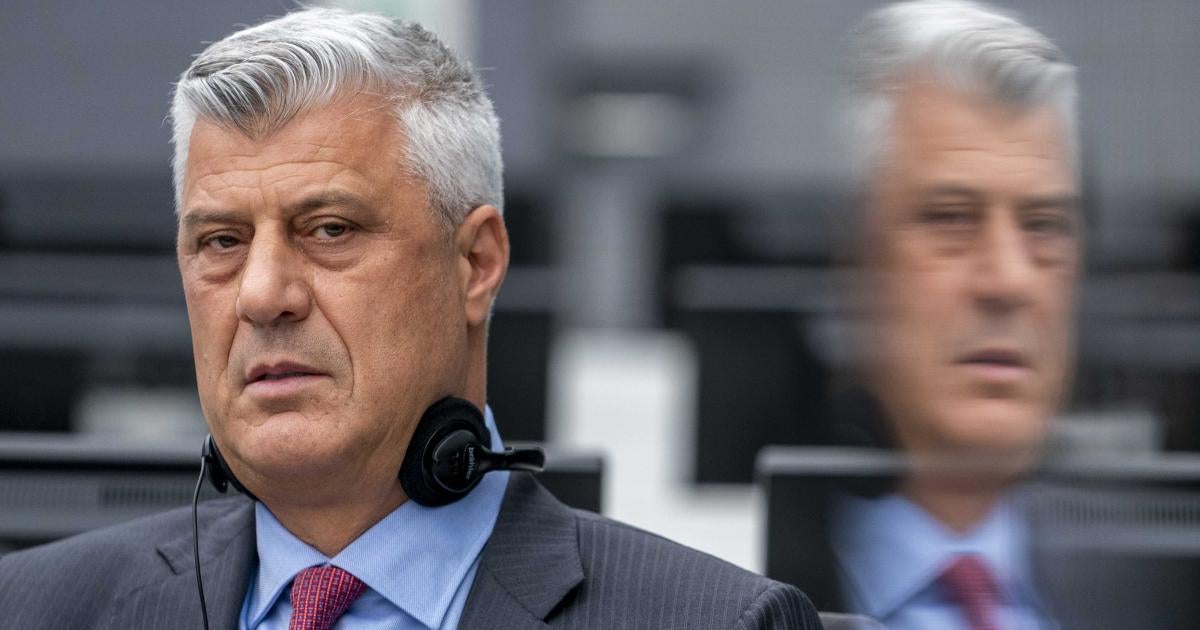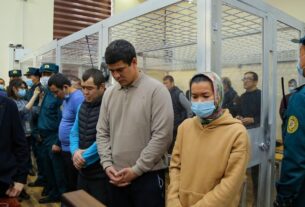(The Hague, March 31, 2023) – The trial of the former Kosovo leader Hashim Thaçi and three others on charges of war crimes and crimes against humanity highlights the ongoing need for justice 24 years after the Kosovo war, Human Rights Watch said today. The trial, taking place before the Kosovo Specialist Chambers in The Hague, begins on April 3, 2023.
Thaçi, Kosovo’s former president and prime minister, is charged along with three other senior members of the Kosovo Liberation Army (KLA), all senior politicians in Kosovo, for crimes during and just after the 1998-99 Kosovo conflict, including in northern Albania. The KLA fought Serbian and Yugoslav forces until a 78-day NATO air campaign forced those forces from Kosovo. Thaçi resigned as president after the charges were brought in November 2020 and was promptly transferred to The Hague.
“This trial is of four people accused of committing terrible crimes during and after the war, when the fighting had stopped, including against people from various ethnic groups,” said Hugh Williamson, Europe and Central Asia director at Human Rights Watch. “It offers a chance after so many years for the victims to learn what happened and highlights the pervasive impunity that still hangs over the Kosovo conflict, and more broadly over the wars in the former Yugoslavia.”
The Kosovo conflict was marked by a litany of war crimes, the overwhelming majority by Serbian and Yugoslav forces, including murders, rapes, torture, forced displacement, and the organized transfer of more than 1,000 bodies to Serbia, where they were dumped in mass graves. The Serbian government has consistently refused to disclose the locations of all burial sites. Only a small number of Serbian military and political leaders have faced trial for war crimes in the Kosovo conflict, including former Serbian and Yugoslav President Slobodan Milosevic.
The Kosovo Specialist Chambers stems from a 2010 Council of Europe report by Swiss Senator Dick Marty that covered serious crimes during and just after the war allegedly committed by some KLA members, including Thaçi. The European Union created a Special Investigative Task Force to examine these allegations. It concluded in 2014 that there were grounds for indictments and the EU worked to form the specialist chambers. The United States government has supported the effort, and the chief prosecutors, to date, have been US nationals.
The unique court is part of Kosovo’s judicial system, after the Kosovo Assembly passed a new law and changed its constitution, but is based in the Netherlands due to the record of threats and violence against witnesses in other cases against KLA members, including at least one death. It employs international staff, as well as judges, prosecutors, and the registrar due to concerns about leaks and witness intimidation.
The defendants are charged with four counts of war crimes and six counts of crimes against humanity, including murder, enforced disappearances, persecution, and torture. The prosecutor alleges that Thaçi, Kadri Veseli, former head of the KLA’s intelligence service, Rexhep Selimi, head of the KLA’s operational directorate, and Jakup Krasniqi, member of the KLA’s political directorate, formed part of a joint criminal enterprise to control Kosovo by “unlawfully intimidating, mistreating, committing violence against, and removing those deemed to be opponents.” The victims of these alleged crimes include Serbs, Roma, and ethnic Albanians who were considered collaborators with Serbian forces or political opponents of the KLA.
The four defendants were arrested and transferred to The Hague on November 4 and 5, 2020. Before the Kosovo Specialist Chambers, the defendants are entitled to a range of fair trial guarantees, including the presumption of innocence, the right to counsel, the right to present evidence, the right to confront witnesses, and the right to an appeal.
Witness protection is especially important for this trial given the challenges with witness intimidation in other cases against former KLA members, Human Rights Watch said. The court should also conduct sustained outreach in Kosovo and Serbia to keep the public regularly informed about the case and the principle of individual criminal responsibility.
In addition to Thaçi and the three other defendants, the court has cases against two former KLA members, Salih Mustafa and Pjetër Shala, and two members of the KLA War Veterans Association, who have been tried and convicted for leaking the names of witnesses in the other cases. Mustafa was found guilty in December 2022 of war crimes against Kosovo Albanian detainees and sentenced to 26 years in prison; his case is under appeal. The Shala trial began in February.
More than 1,600 people remain missing from the Kosovo conflict, according to the United Nations and International Committee of the Red Cross. More than 400 of these cases concern disappearances after the war ended in June 1999 and NATO forces had entered Kosovo, about 100 of them ethnic Albanians and the others mostly Roma and Serbs. The UN and Organization for Security and Cooperation in Europe also established large missions in Kosovo during this time, with the UN administering Kosovo for several years.
On March 18, 2023, Kosovo and Serbia agreed to implement an EU-backed deal on normalizing relations, which includes a pledge to work together on the fate of missing persons.
The International Criminal Tribunal for the former Yugoslavia (the ICTY) did not cover many of the crimes now charged before the Kosovo Specialist Chambers because they occurred after hostilities had ended on June 12, 1999. The International Criminal Court did not yet exist when the alleged crimes took place.
The ICTY prosecuted Slobodan Milosevic and six of his senior officials for grave crimes committed in Kosovo, convicting five and acquitting one. Milosevic died during his trial before a verdict was issued.
The ICTY also tried six ethnic Albanians for war crimes in Kosovo, with two convicted and four acquitted.
The Serbian government has welcomed as heroes the three Serbs convicted by the ICTY for war crimes in Kosovo who were released after serving two-thirds of their sentences. Another of the convicted men, the former Serbian Police Chief Vlastimir Djordjevic, is serving an 18-year prison sentence in Germany after being convicted of, among other crimes, directing “the secret handling, transport and reburial of bodies.” His requests for early release have been denied.
In Serbia, a war crimes court has tried 60 people for crimes in Kosovo, convicting 23 of them. But the Serbian government has shown no political will to prosecute anyone above low-level forces, and some of those cases have dragged on for years.
“The Thaçi trial can help set Kosovo on a clearer path towards justice and the rule of law after a history of oppression,” Williamson said. “And it puts the spotlight squarely on the Serbian government to hold its own forces to account after years of protecting those with responsibility for grave crimes.”



